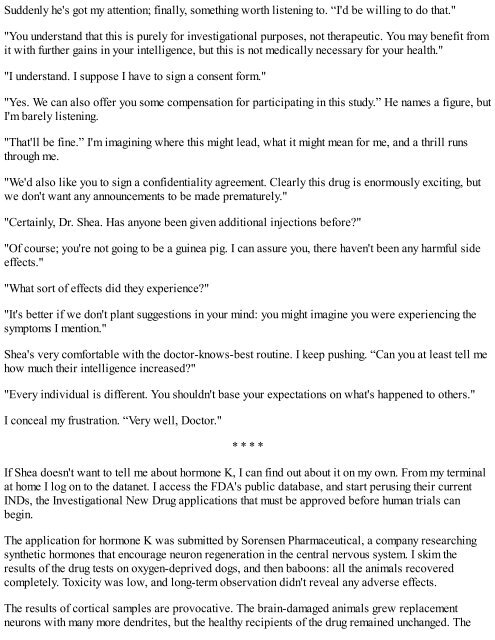Create successful ePaper yourself
Turn your PDF publications into a flip-book with our unique Google optimized e-Paper software.
Suddenly he's got my attention; finally, something worth listening to. “I'd be willing to do that."<br />
"You understand that this is purely for investigational purposes, not therapeutic. You may benefit from<br />
it with further gains in your intelligence, but this is not medically necessary for your health."<br />
"I understand. I suppose I have to sign a consent form."<br />
"Yes. We can also offer you some compensation for participating in this study.” He names a figure, but<br />
I'm barely listening.<br />
"That'll be fine.” I'm imagining where this might lead, what it might mean for me, and a thrill runs<br />
through me.<br />
"We'd also like you to sign a confidentiality agreement. Clearly this drug is enormously exciting, but<br />
we don't want any announcements to be made prematurely."<br />
"Certainly, Dr. Shea. Has anyone been given additional injections before?"<br />
"Of course; you're not going to be a guinea pig. I can assure you, there haven't been any harmful side<br />
effects."<br />
"What sort of effects did they experience?"<br />
"It's better if we don't plant suggestions in your mind: you might imagine you were experiencing the<br />
symptoms I mention."<br />
Shea's very comfortable with the doctor-knows-best routine. I keep pushing. “Can you at least tell me<br />
how much their intelligence increased?"<br />
"Every individual is different. You shouldn't base your expectations on what's happened to others."<br />
I conceal my frustration. “Very well, Doctor."<br />
* * * *<br />
If Shea doesn't want to tell me about hormone K, I can find out about it on my own. From my terminal<br />
at home I log on to the datanet. I access the FDA's public database, and start perusing their current<br />
INDs, the Investigational New Drug applications that must be approved before human trials can<br />
begin.<br />
The application for hormone K was submitted by Sorensen Pharmaceutical, a company researching<br />
synthetic hormones that encourage neuron regeneration in the central nervous system. I skim the<br />
results of the drug tests on oxygen-deprived dogs, and then baboons: all the animals recovered<br />
completely. Toxicity was low, and long-term observation didn't reveal any adverse effects.<br />
The results of cortical samples are provocative. The brain-damaged animals grew replacement<br />
neurons with many more dendrites, but the healthy recipients of the drug remained unchanged. The

















